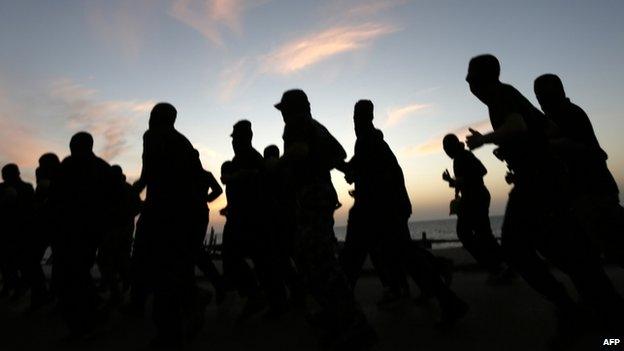Scepticism over Hamas and Fatah reconciliation deal
- Published
Hamas PM Ismail Haniya: "This is good news"
Over the past seven years, the rift between the two main factions - Hamas and Fatah - has compounded the geographical division of the Gaza Strip from East Jerusalem and the West Bank.
Previous reconciliation deals announced amid much fanfare in Cairo in 2011 and Doha in 2012, were warmly welcomed by the Palestinian public. However they were never implemented.
Inevitably, that means there is caution and scepticism about the latest announcement that a unity government will be agreed in the next five weeks with plans for new elections to be drawn up in the following six months.
"I hope this will be real reconciliation but I'm worried by our previous experiences," says Qassim, a Bethlehem resident. "Hamas and Fatah are both in tricky situations at the moment and they may well be acting out of self-interest, not because of the Palestinian cause."
"We remember what happened three years ago," says Tariq, a coffee shop owner from East Jerusalem. "I don't believe this deal will last for long. I believe it's meant to put pressure on Israel to push the peace talks forwards."
Timing here is key. Fatah is looking to strengthen its hand as US-brokered peace talks with Israel flounder ahead of their current deadline on 29 April.
Meanwhile, Hamas wants to end its regional isolation after falling out with Egypt, Syria and Iran in the wake of the Arab uprisings.
'Strong will'
Hamas wrested control of Gaza from forces loyal to Palestinian leader Mahmoud Abbas, during a bloody conflict in 2007, one year after it won legislative elections.
It went on to set up its own government in the coastal enclave. This left the Palestinian Authority (PA) dominated by the Fatah faction, headed Mr Abbas, in control of parts of the occupied West Bank.
A delegation of five members of the Palestine Liberation Organisation (PLO), headed by Fatah's Azzam al-Ahmed, travelled to Gaza City to negotiate with Hamas leaders.
Palestinian legislator Mustafa Barghouthi who joined the talks, told the BBC that by reaching agreement within 22 hours, the factions had shown "a strong will" to implement a new unity deal.

Israel - along with the US and the EU - views the Islamist Hamas group as a terrorist organisation
"What we've managed to do is to open the road to regain back what we've lost - our democracy, our right to have a legislative council and parliament, and our right to have free and democratic elections and a pluralistic system rather than a one-party rule in the West Bank and another one-party rule in the Gaza Strip," he said.
However Israel's reaction to the announcement was very negative.
Prime Minister Benjamin Netanyahu said in a statement released by his office that Mr Abbas "chose Hamas and not peace. Whoever chooses Hamas does not want peace".
A session of talks between Israeli and Palestinians negotiators scheduled to take place late on Wednesday was cancelled.
'Embracing extremists'
Along with the US and the European Union, Israel views Hamas as a terrorist group.
"This is a move by President Abbas away from peace, away from reconciliation," says the Israeli government spokesman, Mark Regev.
"He's embracing extremists who not only Israel, but the international community has called a terrorist organisation.
"We will not talk to a government that has in it people who say my country should be destroyed. Hamas says clearly that Israel should be obliterated."
Palestinian officials retorted that uniting their factions would empower the leadership to make more credible negotiations with Israel and implement any future peace agreement.
In a statement, chief negotiator Saeb Erekat expressed "severe disappointment" at Israel's response.
"National reconciliation is imperative in order to achieve a just and lasting peace. We hope that we will be able to successfully close this dark chapter of our history," he said.
However, the Palestinians know they must tread carefully as they determine the details of any unity government.
Most Western governments forbid foreign aid going to Hamas, and the debt-ridden PA - which relies on international donors - will not want to jeopardise its funding.
Internal disagreements over power sharing and how to handle the conflict with Israel have also contributed to the breakdown of previous reconciliation efforts and could easily dash dreams of reunification once again.